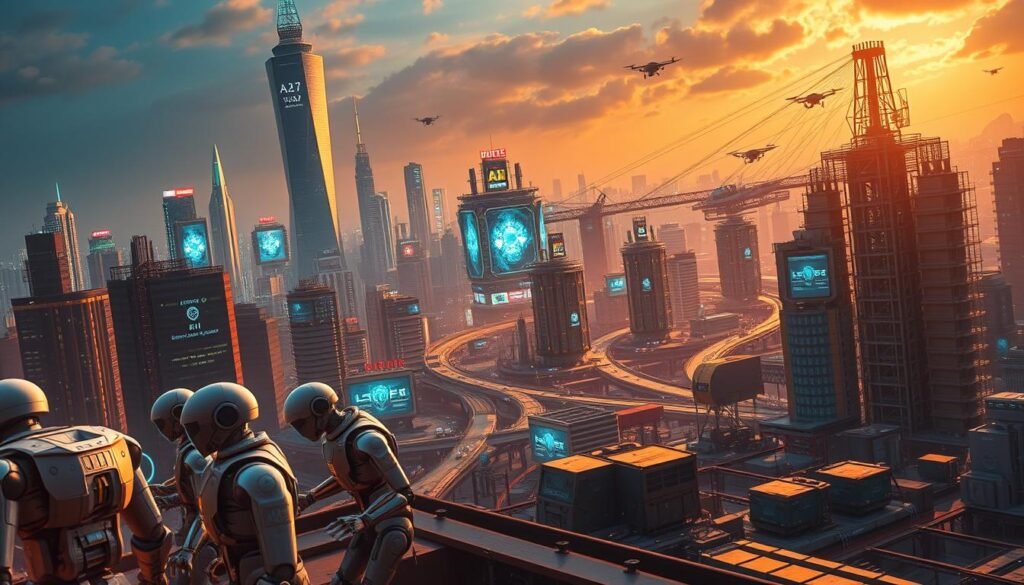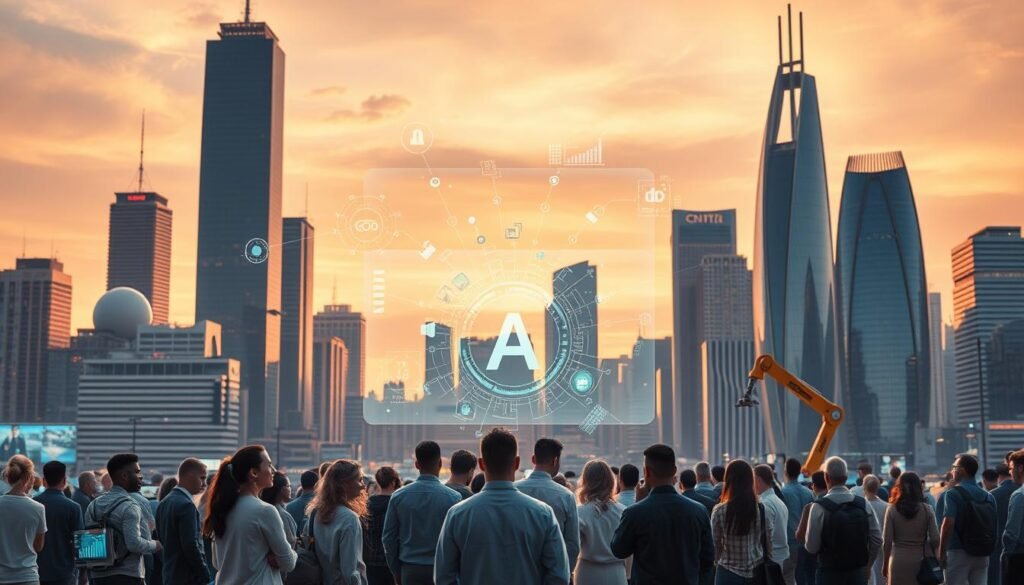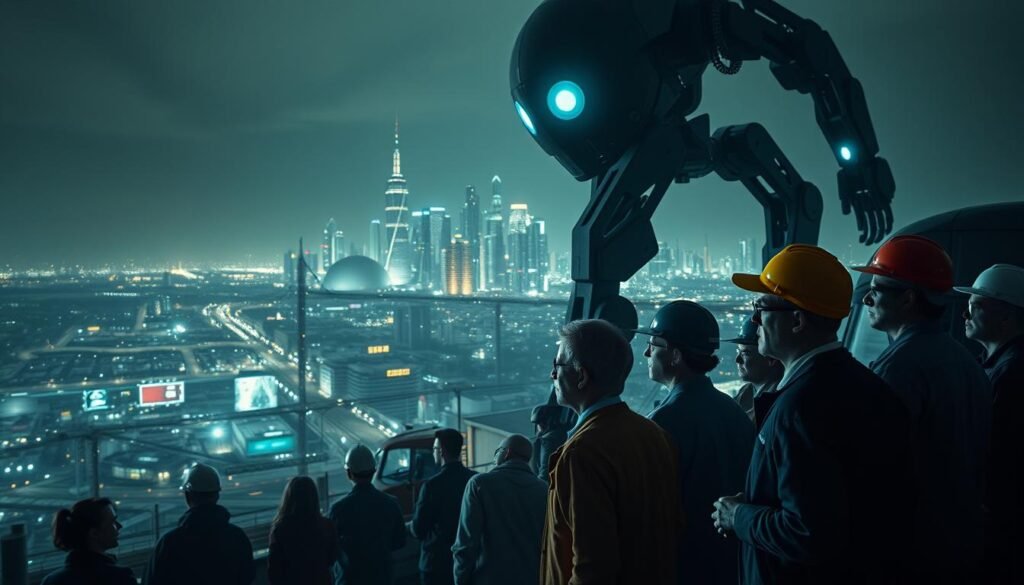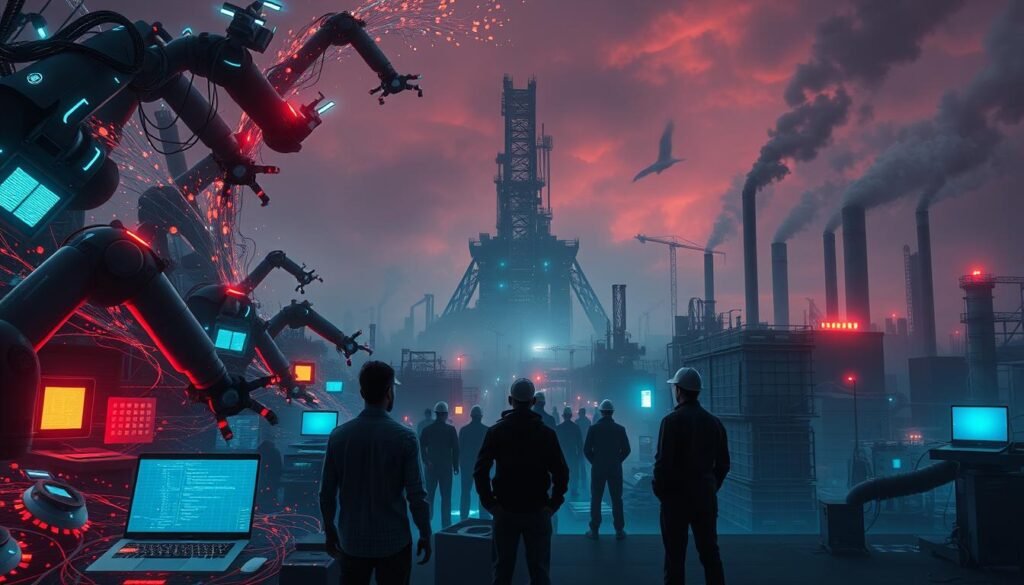Did you know that by 2025, AI and automation could displace around 85 million jobs worldwide, but also create 97 million new roles?
As we move through the changing world of work, it’s key to grasp how Artificial Intelligence affects our jobs. In this article, we’ll look at the jobs that are most likely to be lost and created because of AI. We’ll examine how AI technology is advancing and automating tasks, and the new chances it offers.
For any questions or more info, please contact us at +913422662201 or via email at info@thebinduvisarga.com.
Key Takeaways
- Understanding the impact of AI on employment is crucial for navigating the future of work.
- AI has the potential to both displace existing jobs and create new ones.
- The current state of AI technology is rapidly advancing.
- Automation could significantly affect certain job sectors.
- New opportunities will emerge as a result of AI integration.
The AI Revolution in the Workplace
The future of work is changing fast with AI. We need to think about how AI will affect our jobs and the need for new skills.
AI is changing our workplaces quickly. It’s changing how we work and how we use technology.
Current State of AI Technology
AI has made big strides, making many tasks automatic. Machine learning algorithms and natural language processing have gotten better. This means AI can handle more complex tasks.
AI is being used in many fields, like customer service and data analysis.

The Acceleration of Automation
AI is making automation faster, which worries many. As AI gets better, more jobs might be taken over, leading to job displacement.
But AI also opens up new job opportunities and makes some jobs better. We need to get ready to adjust our workforce to these changes.
For more information or to see how AI can help your business, call us at +913422662201 or email info@thebinduvisarga.com.
Understanding AI’s Impact on Employment
AI’s effect on jobs is complex and needs a deep look. We must consider history and current trends. This helps us see AI’s role in the job market as part of a bigger story of tech growth.
Historical Context: Previous Technological Revolutions
Every tech revolution has changed jobs. The Industrial Revolution moved us from manual work to machines. The Digital Revolution brought in automation and computers. Knowing these changes helps us understand AI’s job impact.
Unique Characteristics of AI Disruption
AI is different because it can do complex tasks, learn, and adapt. Its ability to think like humans is changing industries in new ways. Keeping up with AI’s growth is key.

Key Factors Determining Job Vulnerability
Several things make a job more likely to be automated by AI. These include if the task is repetitive, if it needs human touch, and how complex the decision-making is. Jobs that need creativity, empathy, and problem-solving are safer. Knowing this helps us get ready for the future and find new AI-related jobs.
For any questions or more info, call us at +913422662201 or email info@thebinduvisarga.com.
The Jobs Most Likely to Be Lost and Created Because of AI
AI technology is changing the job market fast. We need to know which jobs might disappear and which new ones will appear. The rise of AI is making some jobs obsolete but also creating new ones.

Data Entry and Processing Roles
Data entry and processing jobs are at high risk of being automated. AI tools can handle big data quickly and accurately. This means less need for humans in these roles.
Customer Service Representatives
Customer service reps are also facing a big challenge from AI. Chatbots and virtual assistants can answer many customer questions. They work 24/7, letting humans handle more complex issues.
Transportation and Logistics Workers
Jobs in transportation and logistics, like driving and delivery, are at risk. Self-driving cars and drones are being tested by companies like Tesla and Amazon. This could change the transportation industry a lot.
Basic Accounting and Financial Analysis
AI is taking over basic accounting and financial analysis tasks. AI software can do data analysis, budgeting, and forecasting. This is good for businesses wanting to make their financial work more efficient.
For more info on AI’s impact on jobs or to learn about our services, call +913422662201 or email info@thebinduvisarga.com.
Industries Facing the Highest Risk of Disruption
AI innovation is moving fast, and we need to know which industries are most at risk. By looking at the sectors most likely to be changed by AI, we can see how it might affect jobs and the economy.

Manufacturing Sector
The manufacturing sector is very open to AI changes. Robotics and machine learning algorithms are making production smoother. They might replace some jobs, but they also open up new roles that need creativity and problem-solving skills.
Retail Industry
The retail world is also seeing big changes thanks to AI. Automated customer service systems and AI-powered chatbots are helping with customer service. AI is also improving how stores manage their stock, changing retail jobs.
Financial Services
The financial sector is also being transformed by AI. Algorithmic trading and AI-powered risk management systems are making decisions faster and more accurately. This might mean some jobs change, but it also opens up new opportunities for financial experts.
Want to learn more about how AI can change your industry? Contact us at +913422662201 or email info@thebinduvisarga.com.
Case Studies: AI Replacing Human Workers
AI technology is changing many industries, replacing human workers with machines. This change is reshaping how businesses work and affecting the future of jobs.
Amazon’s Automated Warehouses
Amazon leads in using AI in its warehouses. Robots and automated systems have made Amazon more efficient and cut costs. These systems can handle orders faster and more accurately than people.
AI in Legal Document Review
AI is making a big difference in the legal field. AI systems can quickly and accurately review legal documents. This makes the legal process faster and cheaper for humans.
Automated Customer Service Systems
AI chatbots are now common in customer service. They offer fast and helpful answers, making human customer service less needed.
Self-Checkout and Cashierless Stores
The retail world is changing with self-checkout and cashierless stores. These technologies let customers buy without a cashier, saving retailers money.
| Industry | AI Application | Impact on Employment |
|---|---|---|
| Logistics | Automated Warehouses | Reduced labor costs, increased efficiency |
| Legal | AI Document Review | Faster legal processes, reduced manual review costs |
| Customer Service | AI Chatbots | Reduced need for human customer service representatives |
| Retail | Self-Checkout and Cashierless Stores | Reduced labor costs for retailers |
For any inquiries or further information, please contact us at +913422662201 or email info@thebinduvisarga.com.
New Opportunities: Jobs Created by AI Technology
The rise of AI is not just about job loss; it’s also about creating new career paths. As AI evolves and enters various industries, new job categories emerge. These jobs require specialized skills and knowledge.
AI Trainers and Ethicists
AI trainers and ethicists are key roles. They teach AI systems to make decisions that are accurate, ethical, and unbiased. They ensure AI algorithms are trained on diverse data and can handle complex ethical dilemmas.
Data Scientists and Machine Learning Engineers
Data scientists and machine learning engineers are in high demand. They design and develop AI models, analyze data, and implement algorithms. Their work helps organizations make data-driven decisions and use AI for a competitive edge.
Human-AI Collaboration Specialists
As AI becomes more integrated into the workplace, specialists are needed. They design workflows, train programs, and interfaces for humans and AI to work together. This enhances productivity and efficiency.
AI System Maintenance and Oversight
Maintenance and oversight of AI systems are critical tasks. Professionals ensure AI systems operate correctly, monitor their performance, and address issues. They also update and refine AI algorithms to keep them effective.
To illustrate the growth in these new job categories, let’s look at some data:
| Job Category | Projected Growth Rate | Key Skills Required |
|---|---|---|
| AI Trainers and Ethicists | 25% | Ethics, AI development, data analysis |
| Data Scientists and Machine Learning Engineers | 30% | Machine learning, data analysis, programming |
| Human-AI Collaboration Specialists | 20% | Workflow design, training programs, human-computer interaction |
| AI System Maintenance and Oversight | 22% | AI development, system monitoring, problem-solving |
For more information on how AI is transforming the job market and to explore career opportunities in these emerging fields, please contact us at +913422662201 or email info@thebinduvisarga.com.
Emerging Industries Powered by AI
AI is changing the game in many areas, creating new industries. These new sectors bring fresh job opportunities and push innovation forward. We’ll look at how AI is changing healthcare, sustainable energy, and education.
Healthcare AI Applications
AI is changing healthcare by making diagnoses better and treatments more tailored. For example, AI can spot diseases in medical images faster and more accurately than doctors. The global healthcare AI market is growing fast, opening up new jobs for AI experts and healthcare pros.
“AI is transforming healthcare by enabling more precise and personalized care.” This change is not just better for patients but also creates new roles for AI trainers and IT experts in healthcare.
Sustainable Energy Optimization
AI is key in making sustainable energy systems better and more reliable. It analyzes data to predict energy needs, find problems, and improve how energy is distributed. This reduces waste and helps use more renewable energy. As we move towards cleaner energy, the need for AI experts in energy optimization grows.
Personalized Education Technology
AI is changing education by making learning more personal. AI systems adjust learning materials based on how well students do. This makes learning more effective and opens up new jobs for teachers and EdTech folks. As “AI continues to reshape the education landscape,” we’ll see more AI in learning and teaching.
For more info on AI’s role in new industries, call us at +913422662201 or email info@thebinduvisarga.com.
Preparing for the AI-Driven Future
The future of work is changing with AI. It’s key to adapt for job security. We must focus on skills that will stay important and prepare our workforce for what’s next.
Skills That Remain Uniquely Human
AI has made big strides, but some skills are still uniquely ours. Creativity, empathy, and critical thinking are at the top of this list. As AI handles simple tasks, humans will take on more complex roles.
A study by the World Economic Forum shows this shift. It found that while AI will do routine tasks, human skills like creativity and problem-solving will grow in value.
Education and Reskilling Strategies
To get ready for the AI future, we need to invest in education and reskilling. We should teach both technical and soft skills that work well with AI. Andrew Ng, AI pioneer, once said, “AI is like electricity, changing how we live and work.”
We must make sure our education systems can adapt to this change.
“The best way to prepare for the future is to learn how to adapt, and to be open to new technologies and new ways of working.”
Policy Considerations for the AI Transition
Policymakers face big challenges as we move to an AI-driven economy. They need to support workers who might lose their jobs and encourage businesses to retrain. A broad approach is needed to make sure AI benefits everyone.
| Policy Area | Current Challenges | Potential Solutions |
|---|---|---|
| Education and Training | Lack of access to quality education and training programs | Invest in online education platforms and vocational training |
| Job Displacement | Workers losing jobs due to automation | Implement retraining programs and social safety nets |
| Business Incentives | Businesses hesitant to invest in AI due to regulatory uncertainty | Offer tax incentives and subsidies for AI adoption and retraining |
For any inquiries or further information, please contact us at +913422662201 or email info@thebinduvisarga.com.
Conclusion: Navigating the Changing Landscape of Work
The impact of artificial intelligence on jobs is complex. It will change the types of jobs available. Knowing how AI affects work is key to adapting to these changes.
AI will replace some jobs, like data entry and customer service. But it will also open up new fields. These include AI trainers, data scientists, and experts in working with humans and AI.
To keep up, it’s important to understand the evolving job market. Knowing the skills needed for an AI-driven economy is crucial. For more information or to discuss this, contact us at +913422662201 or email info@thebinduvisarga.com.


Leave a Reply